The Lady Waves Moniker: Empowering Brand or Sexist Slight?
A Deep Dissection into MSMS's History, Community, Mindset, and Tradition
February 11, 2019
The freezing, 32-degree atmosphere of the Columbus-Lowndes Soccer Complex permeated the skin of several players across the Lady Waves and Blue Waves teams this winter as they battled it out against rival teams, some being strident victories like vs. West Point, others being crushing defeats like vs. Choctaw Central.
The atmosphere was just a small sacrifice to comfort that the players willingly gave up, in addition to the other many sacrifices, including the always pressing time to study, time to catch up on homework, and the time to socialize with friends.
United by their will to become better soccer players and to bond with their teams in the one season before half of their fellow teammates graduate, both the Blue Waves and Lady Waves players’ sacrifices have led to strong individuals and strong teams worth more than the sum of their parts.
The Lady Waves this season were particularly an example of how this continued sacrifice, hard work, and perseverance leads to success, as they advanced to play-offs against Strayhorn High on January 28, 2019. Their final record at the end of the season was 6-4-1.
With the Lady Waves advancing to District Playoffs to represent MSMS, I had a question resurface as a Blue Waves player (and Blue/Lady Waves’ team photographer):
Why aren’t they also the Blue Waves?
Now that I’m actually writing this article, and having had two weeks for this question to brew in my mind, the question has become more nuanced.
If the Lady Waves are a headliner team of MSMS, why don’t they carry the Blue Waves name?
Initially, the difference struck me as odd whenever I transitioned from being a Blue Waves Cross Country runner/Swim Team swimmer to being a Blue Waves soccer player. For all of the other sports here, where I ran and swam with both my male and female teammates alike, we were all united as Blue Waves. The Lady Waves buck this trend.
When I started my first day playing for the Blue Waves soccer team, I noticed how the Lady Waves were an entirely separate entity. While this may in part be due to the fact that Soccer is not a co-ed sport, it was still something that I questioned.
I questioned if it was right that the men’s soccer team should be given the school’s full team/brand name while the women’s soccer team had to have some sort of distinguishing modifier.
The Blue Waves is the brand name for MSMS. It’s what our cross country, swim, and tennis teams go by, as well as our men’s soccer team. The reasons why the Lady Waves’ team name bucks this trend has prompted me to now begin an investigation.
The investigation necessitated five key groups to give their opinions on the issue: the student body, administration, coaches/teachers, Blue/Lady Waves players, and finally alumni.
First up on that list is the Student Body as a whole:
Student Body: Preliminary Polls
On Wednesday, January 30, I was beyond frightened when taking my first steps to begin my investigation. “Was I even qualified to ask these questions?” was a common thought I struggled with for the first few days of my prep work.
Using both our notorious mass email system and Microsoft Forms, I was able to create a poll that was relatively unbiased and short, two important aspects for my polling base. While this poll data is interesting and helpful, I’ll admit the scope is limited and not fully representative of MSMS as a whole.
Now onto the polling data: (You can view it in the gallery listed below)
First some basic identification about the students who responded to the poll.
There were 73 respondents in total to the poll. 32% of the respondents identified as an athlete, while the other 68% did not.
30% of the respondents also identified as male, while the other 67% identified as female. The other 3% identified as ‘Other’ and specified their gender in the description box.
Onto the first true question: “Should we have separate team names between women’s and men’s sports?”
This is where the student body is truly split. 27% believed that the names should remain separate between men and women’s, 44% believed that the names should not be separate, and another 29% of the student body had no opinion.
Where things get interesting is that the polling data for this question: “How do you feel about the following statement: Having a separate name for the Women’s teams (like Lady, etc.) indicate different expectations/reputations compared to the Men’s teams which carry the school’s full team name and mascot.”
Openly, 60% of the student body believes that different titles given to women’s sport teams have an effect on the expectations of those teams.
Of that 60%, 45% saw small, but noticeable correlation between the name and those different expectations and the other 15% seeing a strong correlation. 11% said that the correlation was weak and did not support the claims and the other 21% said that there was no correlation entirely.
Why this is interesting relates to the next question, as it asked the 60% of the individuals who said that there are differences in expectations relating to the team names if that difference is perceived to be based in sexism.
48% of those individuals believed that the different expectations caused by the differences in team names were due to sexism, while the other 20% believed that the different expectations were not linked to sexism. Another 32% couldn’t definitively decide either option, saying “maybe” to the poll.
At the end of the poll, a non-required question asked the student body for their further opinions on the issue, two prominent opinions related to sexism I’ll share.
Kelsey Hollingsworth weighed in fiercely, saying, “I think that we should have the same expectations for both sports teams and distinguish the teams by saying “girls/women’s soccer” or “boys/men’s soccer”. This practice of distinguishing the teams by adding more feminine qualities is sexist and outdated.”
A different opinion came from Victoria Waller and counters in from the opposite perspective.
“I do not think there SHOULD be a separate name, but I also do not think that having a moniker specifically relating to women is a bad thing. In an effort to make our society an equal, feminist one, often people (including women) will stray from feminine things because they think it makes them seem weak. There is nothing weak about being a woman (or a Lady) and I like how our women’s team being called the Lady Waves imply that they take pride in being a woman,” Waller stated passionately.
Other opinions throughout the polling were that the distinction between the men and women’s teams were purely to avoid confusion when discussing performance of one team or another.
Many believed that it served a simpler, but similar purpose to the modifiers we use to describe sports themselves, like women’s soccer, men’s soccer, softball, baseball, etc. Those connotations, they believed, were already specified in the name, which would not require the speaker to specify which sport they were talking about.
One word to sum up this survey would be “mixed.”
It became clear to me that I needed to construct a debate in a healthy environment to bring out some of the specific viewpoints and arguing points that people would use for this topic.
Having people just comfortably say yes or no to a list of questions wasn’t going to be satisfactory for getting to the bottom of this investigation.
I needed to see what my fellow classmates would use as a defense and as a prosecution in order to advocate their personal opinion.
A Debate Class Discussion: “It’s something we should look at as empowering.”
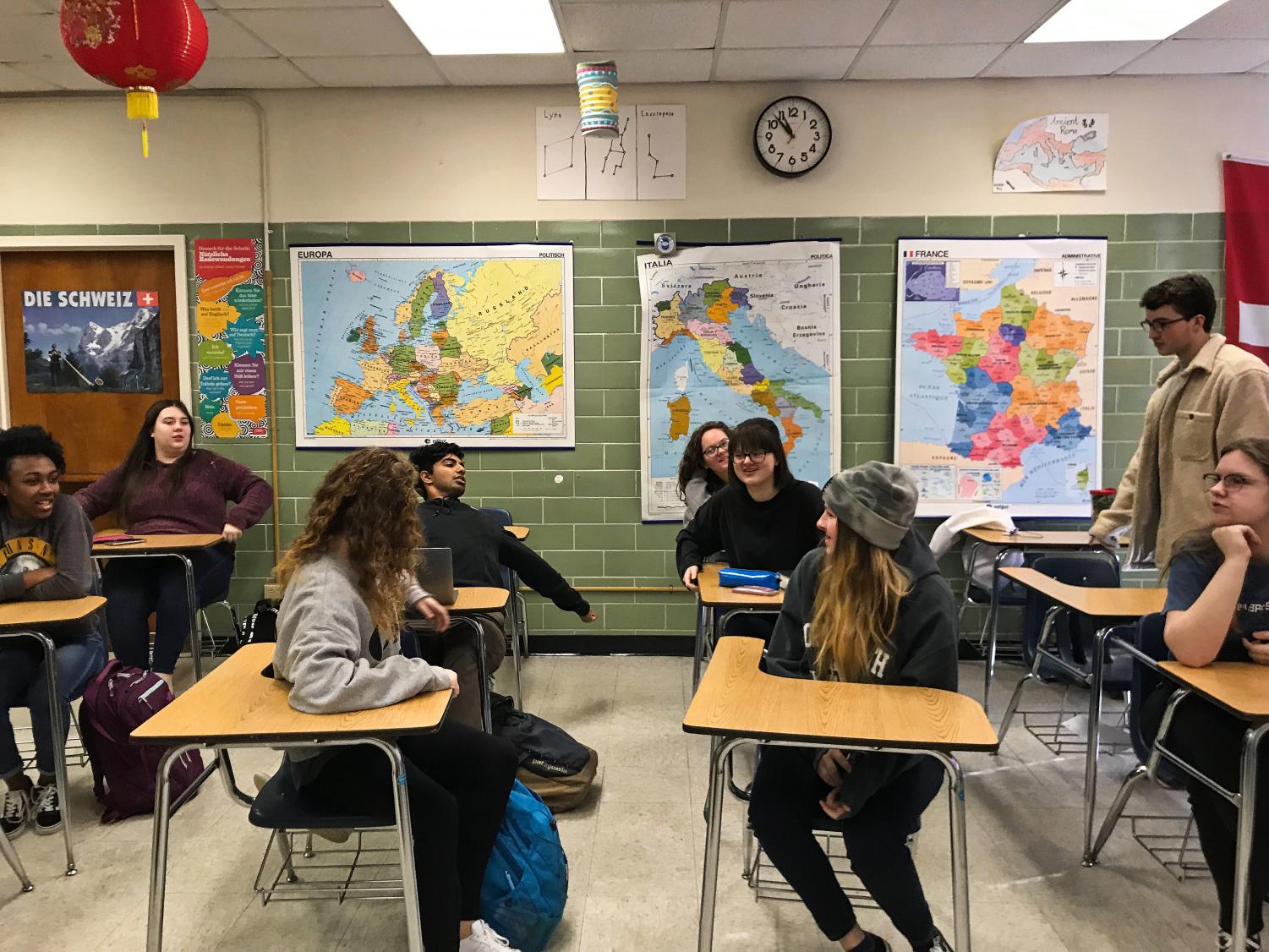
Mrs. Pierce’s 2nd Block Debate I class discussed their opinions on the Lady Waves’ name.
Earlier that week, I suspected that the poll would give me a little bit of data to go off of, but it wouldn’t help me reach the root of the issue.
A debate class would be the perfect environment to begin an experiment to see where the students’ beliefs truly lie.
And with that idea in mind, I talked with Mrs. Pierce about the idea of presenting and beginning a class debate on the subject matter. She gave me the green-light, and I constructed a PowerPoint. (You can view it in the gallery below.)
Some notable facts I stumbled across in my research are that several of colleges use to have the differentiator, but have since dropped it due to wanting a cohesive and equal athletic environment.
An example of this is that the “Mississippi State Lady Bulldogs” just became the “MS State Bulldogs” in 2012, an example of all teams across a campus sharing a singular brand. Other examples are present right here on campus.
The Mississippi University for Women doesn’t distinguish between its men’s and women’s teams outright through name, only by the type of sport. Everyone on the W’s sports teams are just called the “Owls.”
Not all colleges have adopted this change. Delta State University maintains a distinction, even if the name brings about contradiction to the general concept. The “Delta State Lady Statesmen” is an example of what we in English class would call an oxymoron.
A good number of high schools have this sex-specific distinction, including MSMS.
However, the students didn’t believe this was necessarily a negative thing. There were three main views from the lengthy debate.
(For Clarification, Maddie Mitchell took some notes during the debate to assist me while I was up giving the PowerPoint and introducing questions. The notes are down below.)
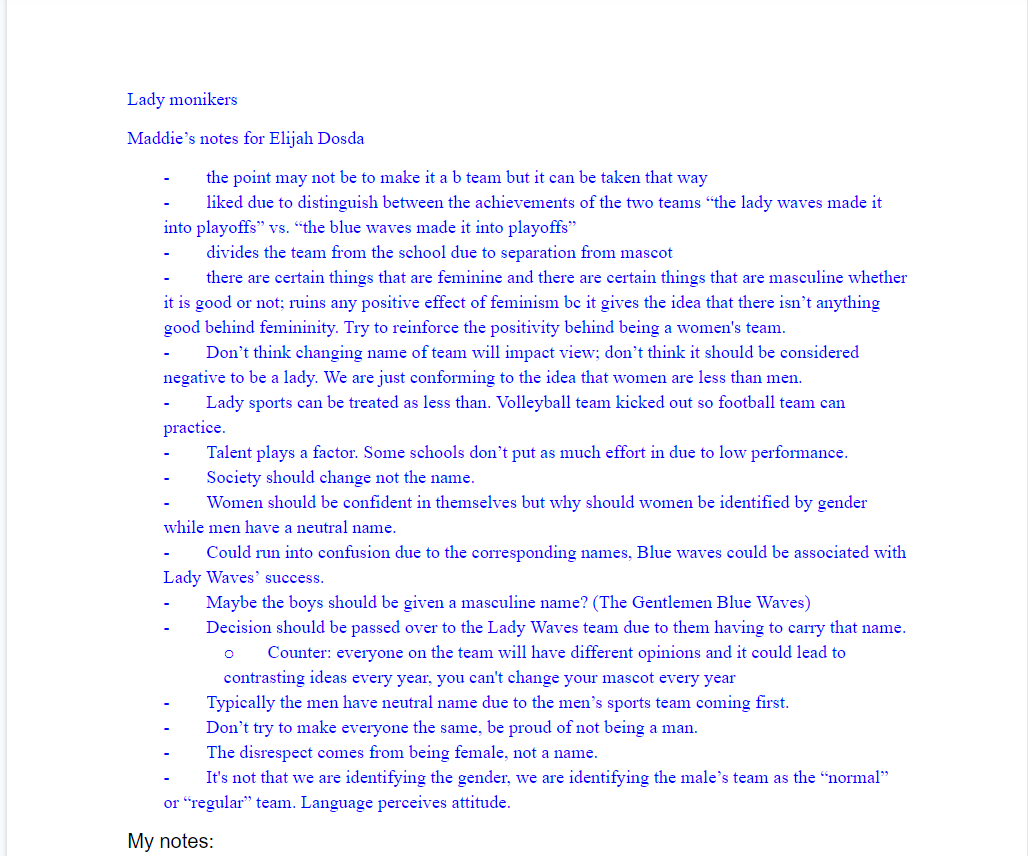
The students first felt that the distinction was necessary, since they didn’t want to get confused in a conversation when talking about the “Blue Waves”.
Many of the people in the classroom saw the separation of team names solely-based on sex, but also countered that it should be up to them to change the stigma behind the label, but not the label itself.
And finally, a good amount of the students were Lady Waves players, and believed that the different name gave them their own identity, and that it was something empowering.
The main voice of dissent was Ryley Fallon, who believed that the exercise of separating the team names only on account of sex was something unfair, and even though the Lady Waves had made that distinction something empowering, it still wasn’t solving the root of the problem.
“I feel that the (lady) moniker is an unnecessary form of classification that opens the door for presumptions to be made,” Ryley argued.
She further illustrated her concerns about the general public perceptions of the two names.
“Unfortunately, I do believe that there is expectation differences. The thought of making assumptions simply based on someone’s gender is an unpleasant thought, but I think many people do it without realizing that it is wrong, especially if they live in an environment where those ideas are highly perpetuated.”
A deep discussion behind the definition and the standards of feminism soon became the topic of the debate. The class came to a general consensus that feminism should not be defined by women turning away from the ideas of femininity, but should be embracing what makes them a woman.
Several of the women in the class believed that by changing the name of the team, in some aspects, it would be admitting defeat to the sexist ideologies that women are less than men. To combat this several key students like Arin Kelly, senior Lady Wave, brought up the idea of changing the perception behind the Lady moniker and not changing the Lady moniker itself.
Mrs. Pierce, the Debate I/II and foreign languages teacher, was quite torn on the issue.
“So my personal feeling was and still is that I would like the gender taken out of the name. I think it was hard to hide that in the debate. (It’s) only because we don’t think about how the gender affects us because we’re so use to hearing it.”
A little later Mrs. Pierce commented on some of the valid points brought up from the debate. “But I do think there was some good validity, we had a good discussion about do we have to honor (the femininity), or do we have to change who we are? The teams are divided by gender and recognizing that is okay, so I don’t know.”
One of the main problems that students tried to address from the debate were focusing on what happens if the next group who arrives doesn’t like the name.
Faith Ivy, a student from Debate I brought up some of the inherent problems with changing the name based on team opinion.
“I feel we should not change the name at all. I’m open to just having the Waves name and letting each team/club add their own adjective on top of it, but then again I’m not. We will run into the problem of the next class not liking our name and then we’ll just end up repeatedly changing it every year.”
Mrs. Pierce also shared a similar sentiment.
“(Another question is) would it be different next year? That’s the bigger question because if we go based off of what the students feel, what if the team next year feels differently?”
That question would have to be left to administrators in later interviews.
But that would have to wait for a bit later, as my next stop in my investigation was to ask the Lady Waves Head Coach on his opinion about the issue.
Little did I know, in that I would find a new lead in covering a much deeper history of the Blue Waves in his interview, and in following interviews with administrators find out some of the current internal objectives that are leading MSMS to look for an entirely-new branding.
Coach Yarborough: “A name is superfluous.”
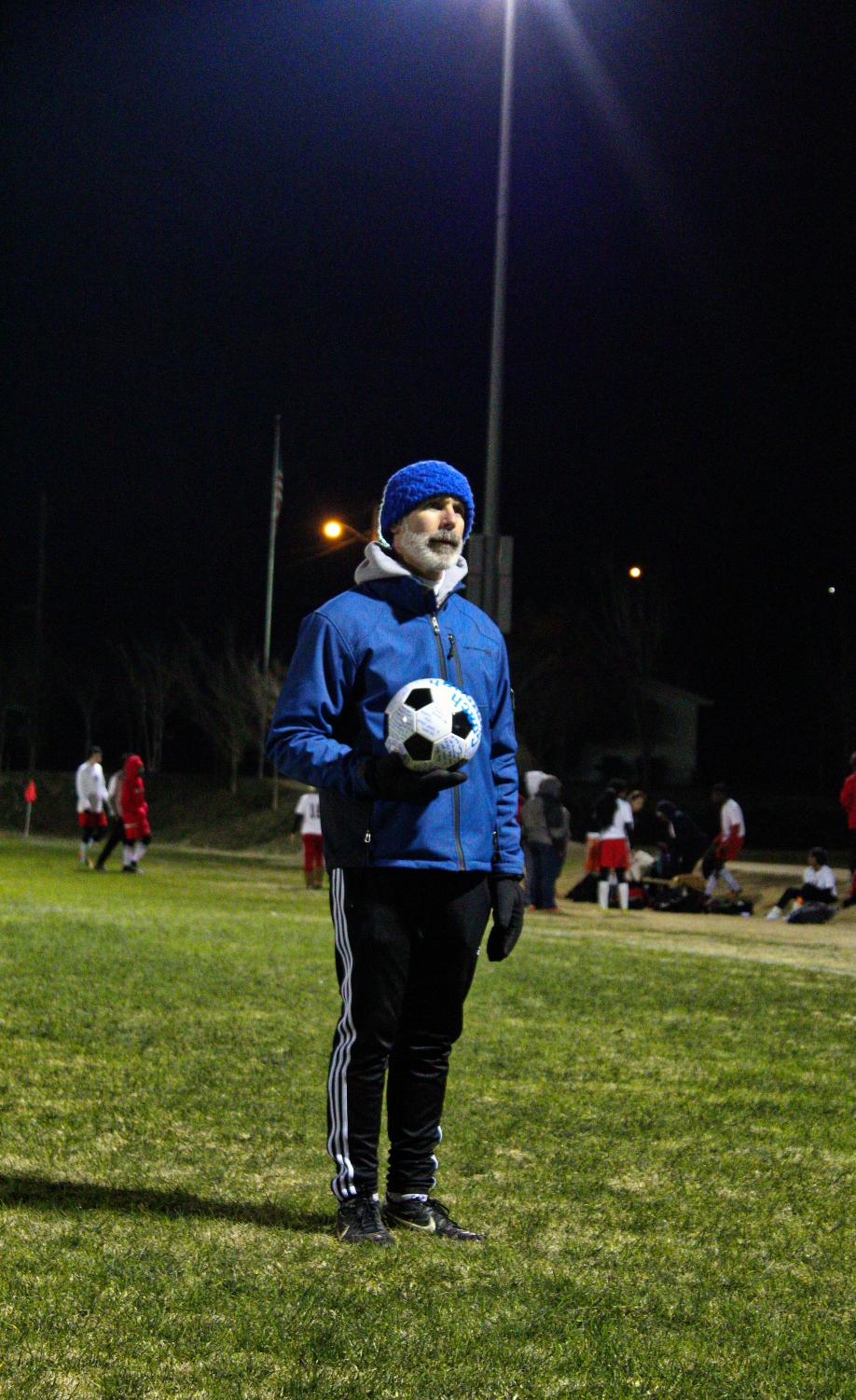
Coach Yarborough stands for Senior Night for the Lady Waves.
When I sat down with Head Coach of the Lady Waves soccer team Chuck Yarborough, he immediately began to suggest that a social media post from the MUW Athletics page is what helped raised awareness about this topic.
“It came unto me, of course the W has just begun their sports program, and on a post somebody online made a reference to the women’s softball team, calling them the ‘Lady Owls’. A professor corrected them saying that it is just the Owls, that everybody’s the Owls. And that made me realize that some people care,” he said, chuckling at the last part.
He then decided to let the Lady Waves decide for themselves whether or not they wanted to change their name.
“So I asked the girls, we’ve just been the Lady Waves because we’ve always been the Lady Waves since before I got here. Do you want to be the Lady Waves, or do you just want to be the Waves? They discussed it and decided to stick with the Lady Waves because they wanted to be distinctive from the boys.”
The Lady Waves didn’t want to be named Blue Waves.
It was shocking, but verifiable that the Lady Waves didn’t want to be called the Blue Waves.
I had seen similar perspectives from the team members from the debate class discussion the day before. They felt that the distinction was important because they didn’t want their performance to be confused with that of the Blue Waves (men’s) team.
Mr. Yarborough also revealed that a team’s name has a relatively low importance to him.
“To me the name means nothing. What’s really empowering is what happens on a team and on a field. And the name is just superfluous.”
Another interesting aspect that seems to have varied from person to person is their idea of the costs estimates of revising a team name or mascot. For soccer at least, the price wouldn’t be too high because of the already present 3-year cycle that helps get the team newer equipment and wear at different intervals.
“So as far as cost is concerned, it would make sense to change it out for the next cycle (of equipment/jerseys). For the Hoodies, they say Blue Waves and Lady Waves are distinguished so that at the end of the season when we get them back, we can make sure they match up,” Coach Yarborough suggested.
When coming to a decision like a name change, he believed that it should be something that the student body should have a say in as well as the administrators and lastly the alumni (more on that later).
It was a few seconds later that I would learn that the Blue Waves has a secondary meaning. I asked him if the variations that some of the clubs and activities that we have at MSMS help build a larger community by having their own spin on our school brand name. (For instance, we have the Blue Knights, Blue Notes, Sine, CoSine Waves, etc.)
He felt that it did, but he delved into that last example further from the Engineering club. “I wasn’t here when the Waves mascot was originally selected, but from what I understood from the other teachers was that the original idea behind the Blue Waves was that it was a play on the sine, cosine and tangent waves, and it was intended to serve that double meaning.”
The Blue Waves’ real meaning served as a pun for sine, cosine, and tangent waves.
I found this a bit funny, commenting myself, “Wow, what a pun for a math school.”
Mr. Yarborough agreed before continuing on, “Yeah, it’s perfect, isn’t it?”
“A mascot can be something people can rally behind and have fun with, but I don’t believe it’s the defining part of the athletic experience or community building. I think where that comes in is people interacting with each other as a part of a team, or a competitive group of any kind.”
Class of 2015 Alumni Speak Up
I contacted both Ross Berry and India Yarborough as a part of the investigation process because their opinions mattered when trying to reflect at least a little bit of the sentiments of the entire MSMS community.
Both were soccer captains of the 2015 year and have similar opinions when regarding the differences in names between the Lady Waves and Blue Waves.
Ross said that the meaning behind the Blue Waves/Lady Waves team name/mascot did not mean too much to him because of a lack of a push for the brand over the school.
“Even though I was actively involved in three out of the four sports MSMS competes in, the fact that we were the Blue Waves/Lady Waves will easily escape me, as I do not feel that our ‘mascot’ is all that prevalent in our school.”
India on the other hand, while agreeing to not have much of a meaning behind the names itself, did have a personal meaning about the players behind the name, “The young women behind the Lady Waves are strong, intelligent players who want the best for their themselves, their teammates and their school. That was the case when I played, and I have no doubt that mindset persists. We were a family, coming together to blow off steam, improve our game and compete to the best of our abilities.”
The name differences to them didn’t embody different expectations between the two teams, at least in MSMS soccer’s case.
India debated the idea stating, “Let’s be honest – MSMS’ reputation does not revolve around its sports programs. Unfortunately, that means both of our soccer teams don’t always get the respect they deserve. But I don’t think either team is less respected than the other in the eyes of MSMS students, faculty and staff, and alumni.”
They did have contrasting opinions on the actual name change itself, Ross stating that he’s in favor of keeping it as it is because that’s what people will still refer to naturally when speaking.
“Even if the school were to pass something formally stating that the young women’s soccer team and the young men’s teams were to be stated as only the ‘Blue Waves,’ I feel that the student body and those involved in the sports would still refer to them as the ‘Lady Waves,’” Ross said.
India felt that she could go either way on the issue, but felt that it should be something the community agrees upon.
“I don’t have any objections to calling both teams the Blue Waves. I think a decision like that would have to include the voices of current players, faculty and staff, and alumni. It would also need to be made with monetary considerations in mind, as renaming a team means new jerseys and apparel and perhaps a new logo,” India proposed.
India continued stating that it should be done with reason.
“A new name should be as meaningful to future generations of students as the current names have been to former players,” she ended.
Finally Ross and India left me with these comments
“We’ve come to a point where classifications and names are a prevailing issue in a young adult’s life. It’s all over social media, the news, and general conversation. I do think that it is important to point out these distinctions and converse about them, but just because a team makes a distinction between its male and female players does not mean that they are not equal,” Ross Berry argued.
India jabbed the Blue Waves a little at the end of the interview saying, “Regardless of name, the Lady Waves can kick the Blues Waves’ butt.”
These two graduates’ input broadened my perspective of what a comprehensive investigation of this topic would have to look like.
Now it was time to begin researching and interviewing various viewpoints from throughout the school. One of the leads I got from Coach Yarborough was Dr. William Odom, a key figure in the early days of MSMS Soccer.
It looked obvious where my investigation would go next.
Waves Soccer: A Lost MSMS History
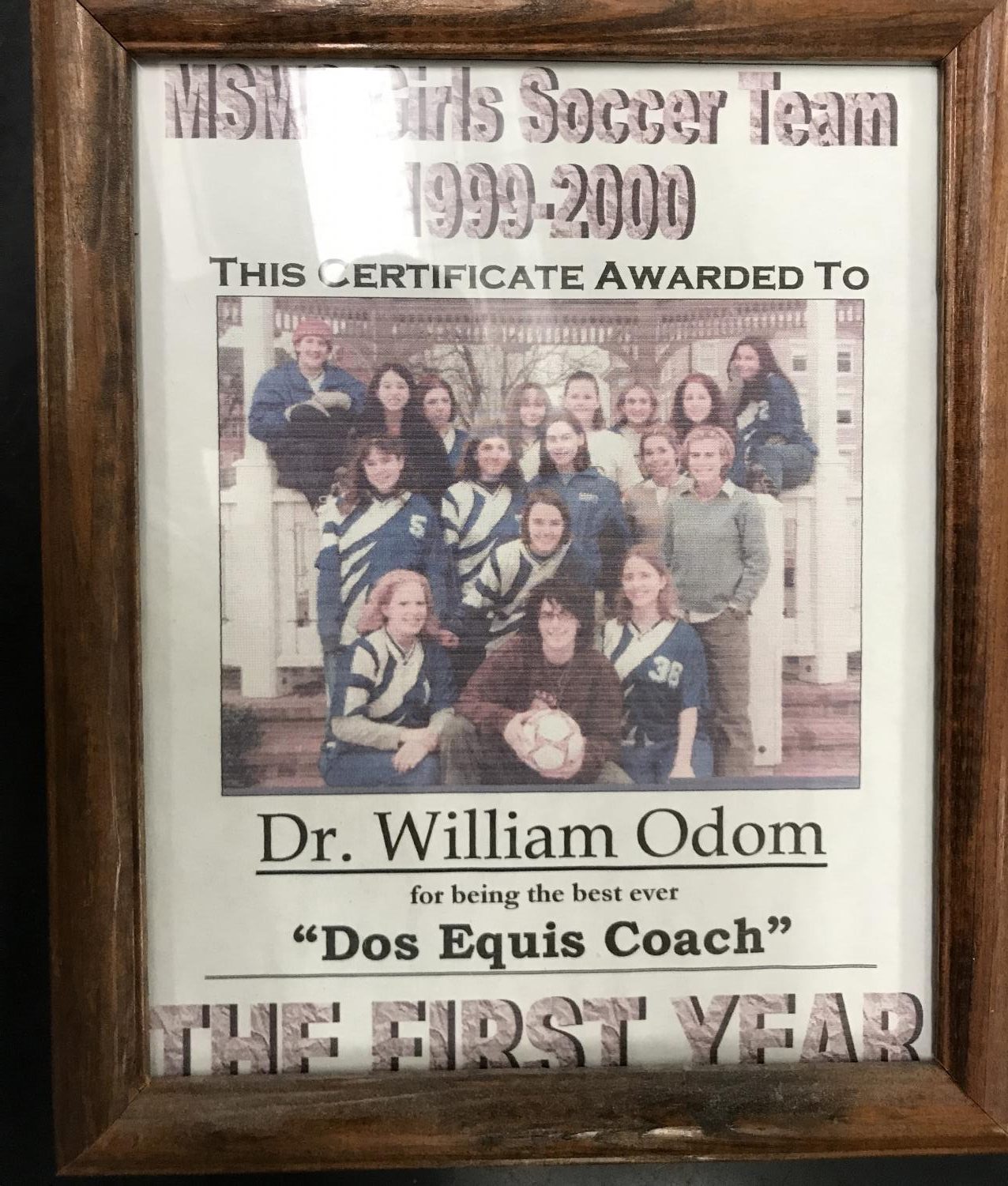
Despite the MSMS girls’ soccer team splitting off in 1999, they never used Lady Waves in their official name.
I arrived at Dr. Odom’s office, hoping for some insight to the history of the Waves soccer teams, and immediately found out something interesting.
“Yeah, the first couple years we had co-ed (team). It was phenomenal. You know, because of who we are, we have problems getting enough athletes. There were like three girls that started on the team, but then they realized that they wanted a team of their own.”
The Blue Waves were originally a co-ed team.
The co-ed Waves team was started in 1996, when Dr. Odom was asked during the hiring process if he wanted to start a soccer team for the school. It was co-ed for only two years.
The first year of the girls’ soccer and boys’ soccer splitting off to become two different teams started in 1999, after enough of the student body joined both sides to form teams large enough in sides to be practical. After the two independent teams formed, they needed to remain a team for at least a year for the Mississippi High School Athletics Association (MSHSAA) to recognize them officially in their league.
“So what happened was in the first year of their organization, we missed the cutoff for the MSHSAA. So the girls couldn’t actually play in the first year even though they were undefeated.”
Dr. Odom had often switched between coaching the Blue Waves and Lady Waves teams and at first that co-ed team in 1996, before handing it off to Coach Yarborough in 2013 season.
The way soccer practiced and played games back then was uniquely MSMS. They only practiced two days out of the week and pushed all of their games to Friday and Saturday so that the students could focus on their academics. This all changed due to pressure from the MSHSAA to maintain a normal athletic schedule to remain in the league, however.
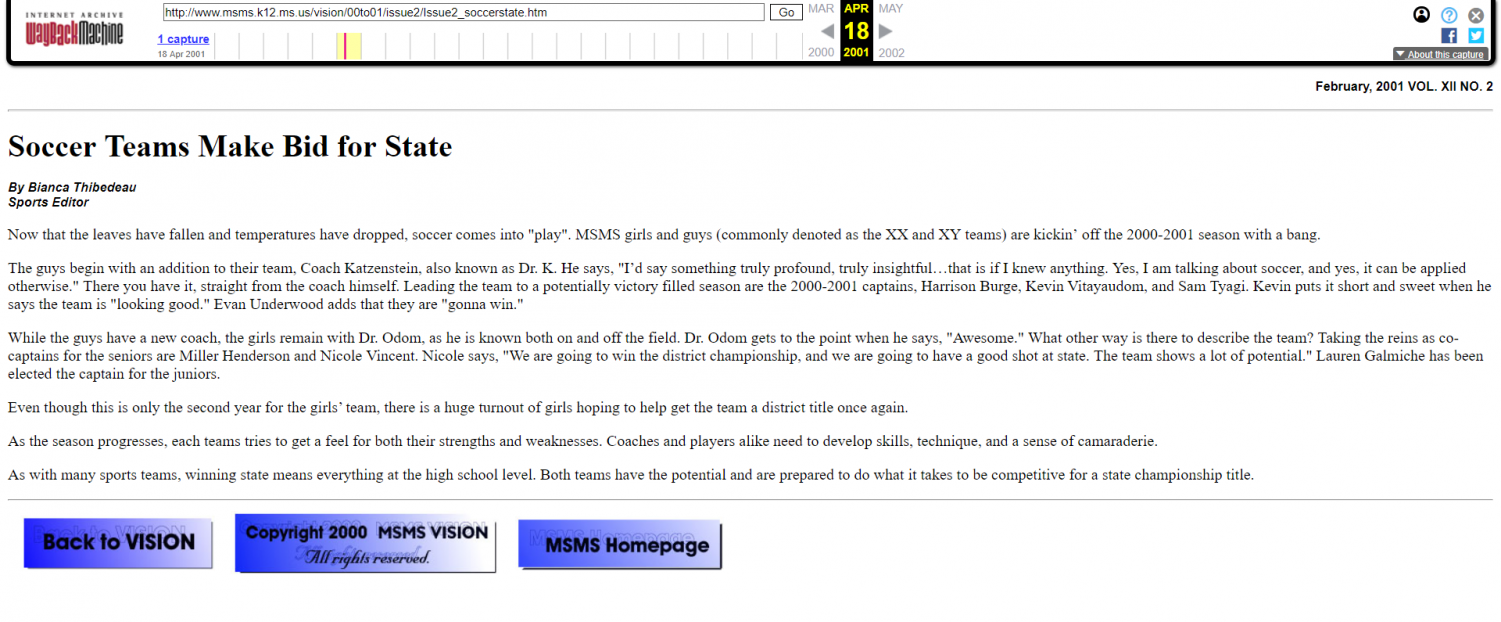
The teams were nicknamed XX and XY according to a Vision article from February, 2001.
“(Other schools) played a lot more games than us. MSHSAA was trying to get us to squeeze in all these games, but we couldn’t get enough in our division by only playing on the weekends. So we ended up having to change to play Tuesday nights as well.” Odom said.
Despite MSMS now being in a 3A Class, it wasn’t always the case. In the 2012-2013 seasons, Dr. Odom recalled MSHSAA redefining MSMS to be a 4A Class school, bringing a whole new tier of challenging matches to the teams.
The Lady Waves brought home 1st Place in the 3A Division in 2011 before the switch to 4A occurred in 2012, but the new season against other 4A teams wasn’t as successful.
The most challenging aspect to the Waves teams may not have been the shake-up in the divisions, but rather finding a place to practice.
“One of the biggest challenges was finding a place to play. We used to have to play behind Joe Cook Elementary school, at a place I call the ‘mud pit’. That was before we tried to revamp the PAC field. We also didn’t have a place to practice with lights.” Odom began.
By revamp, Dr. Odom described that they took all the soccer students and had them clear up the field from some of the remains of an old dormitory. The PAC field is currently where some of the Wave’s players practice off-season, so it interesting to hear about its origin.
Eventually an agreement was made with Joe Cook Elementary to let the Waves practice on their fields so they wouldn’t have to continue practicing in the dark or with rocks in the PAC field. The agreement was in exchange for the city of Columbus to use the Olympic-sized swimming pool that existed in the old athletic facility for the MUW.
One year, the executive director considered dropping the MSHSAA entirely and relying entirely on intramural sports (like flag football).
“When the current student athletes who were already a part of MSHSAA heard about that, they and their parents weren’t overly thrilled.” Odom mused.
Finishing this 30 minute interview, he gave his opinion on the topic at hand.
“A student was talking to me about it, and I heard one of them say ‘I like it’ and then I heard another student say ‘eh, lose it’. I think it should be up to them. I perceived it as a slight, but when I heard the young lady here say (that she liked it), I thought that maybe it’s just their perspective that matters.”
Lady Waves: An Empowering Perspective
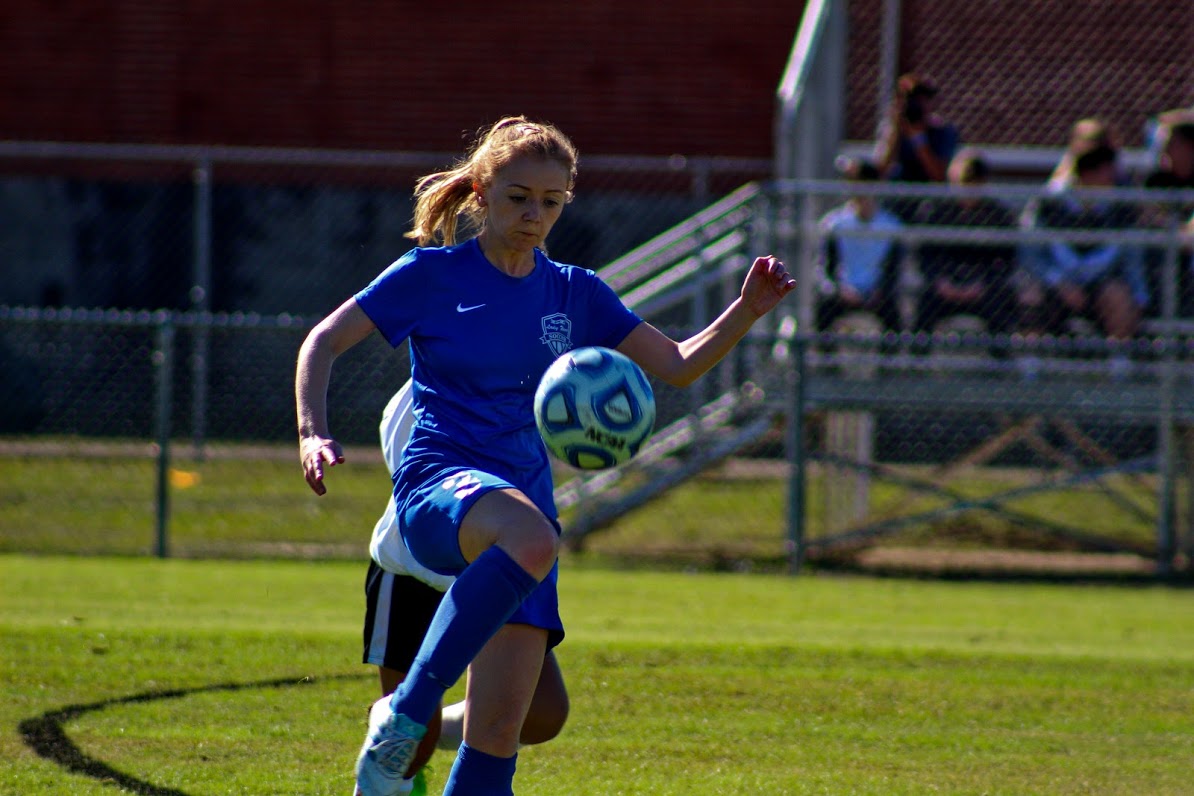
Junior Taylor Willis juggles the ball to receive a pass.
So what does Lady Waves mean to the soccer players here? I got a small idea from my debate class, but I wanted to see where more of them stood.
I sent out another Microsoft Form to the Waves players, but not to as much success as I had hoped. Fortunately though, several of the people who did follow through with the poll stated their opinions for what the name meant for them.
The general consensus that I’ve gotten from everyone so far is that the Lady Waves name is empowering, something akin to a sisterhood. This was verified by a couple of people that I interviewed.
“Lady Waves means sisterhood among us and a sense of pride to be a part of an all girls sport. It’s feminine and pretty but we still have the same standards as any of the boys teams,” Samantha Broussard commented on the Microsoft Form.
Niyah Troup also gave her thoughts in a quick interview, saying “We need to be distinguished from the boys team, yes, but the name “Lady Waves” gives empowerment to the lady sports teams out there. I think that the Lady Waves really gives us a distinction between the boys and the girls, and I like the way we put ‘Lady’ in the title gives me more inspiration to do what I do.”
Senior and goalkeeper Millie Perdue fell more in the middle, but acknowledged that the Lady Waves is something powerful.
“I don’t really think I’ve ever considered Lady Waves, but I really don’t think it matters. Whenever we play together we are called Soccer Sisters, and it is kind of like a sisterhood that you get from being in the Lady Waves. If they did change the names, I wouldn’t be against it, but I’m not exactly for it either. I’m on the fence about it. Lady Waves: It’s powerful,” Perdue stated to the Vision.
Josiah “JoJo” Kaler, a member of the Blue Waves, felt differently. “As a Blue Wave, the Waves represent MSMS as a whole. Waves move as one and MSMS is brought together through a shared lack of sleep and surplus of stress. I like that it represents our togetherness yet also our strength.”
Kaler then went into his feelings about the Lady Waves name.
“I don’t think the Lady waves is discriminatory in any way, but I feel that it’s shallow that we identify a team just based off their gender. I feel like we’re robbing them of the opportunity to have a name that means more than just their gender,” Kaler reasoned.
The MSMS Wave players’ general viewpoint that the “Lady” modifier is something positive and empowering is different than some other outside opinions.
An article by the Tennessean describes the potential of the “Lady” moniker in college teams as creating a binary.
“I think it has created this binary: the norm and what’s out of the norm, the good and what’s not so good, this is the real sport and this is the other sport,” Ketra Armstrong, a professor at the University of Michigan told the Tennessean.
This article, however, also shows the opposite viewpoint that the name can be empowering. A former member of the University of Tennessee Lady Vols swim team, Mollie DeLozier also told the Tennessean, “I would argue that it’s a sexist perception on their part to think that it somehow devalues the athlete. They’re putting their own interpretation on that. It has a value I don’t think you would find at any other program.”
Overall, much like in that article, here at MSMS we’re stuck in a dilemma of honoring tradition and looking forward to embrace inclusivity. The Lady Waves feel that the name in general is something positive, some students feel the name is negative, and others fall into the middle not caring either way, and not seeking to change anything because it’s been tradition and stayed the same over the course of 23 years.
Now we arrive at the administration for their thoughts on the issue, with the first one I interviewed being Mrs. Kelly Brown.
Mrs. Kelly Brown: “We don’t have separate names.”
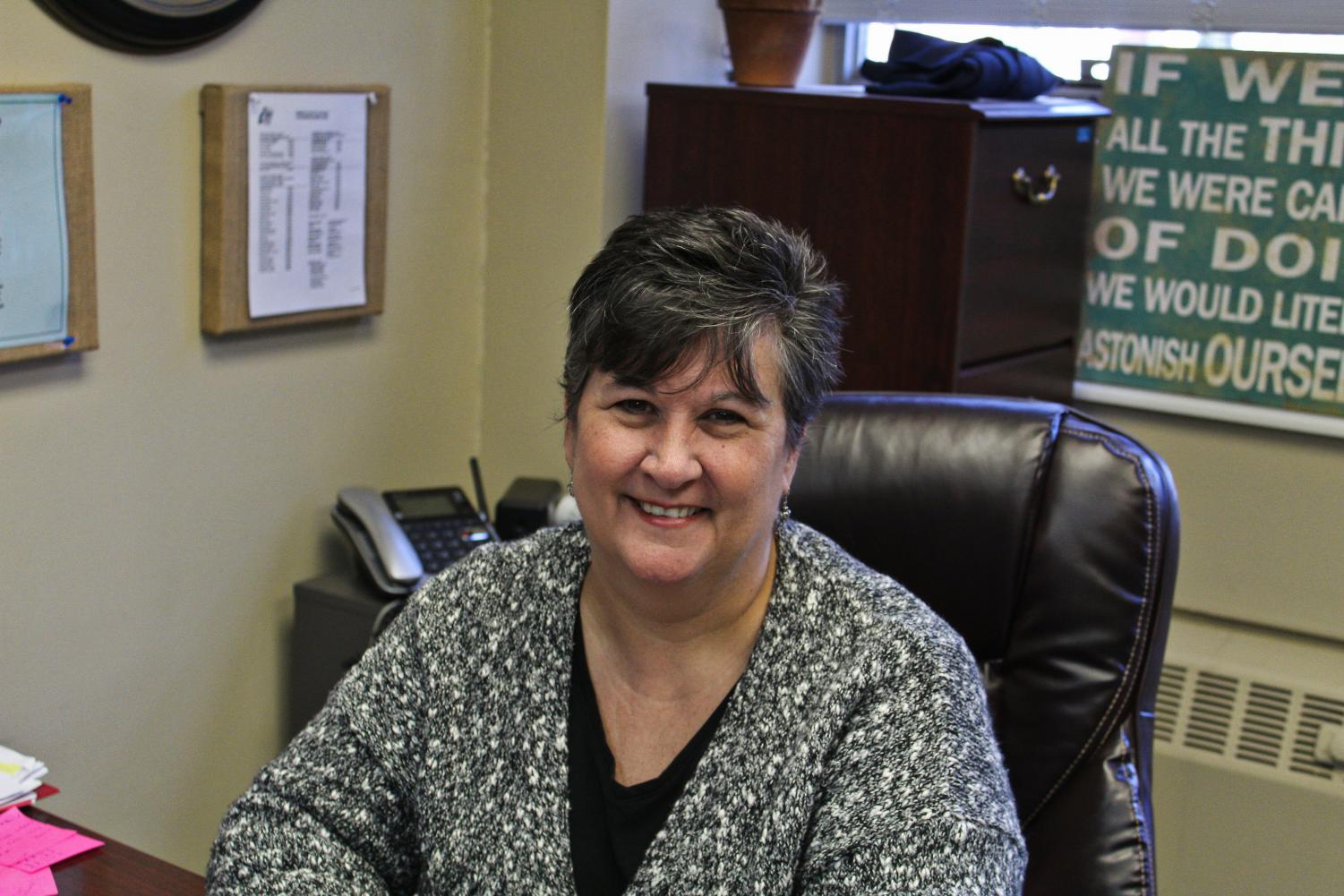
My first administrator interview was with the Director of Academic Affairs, Mrs. Kelly Brown.
Now that all of the student and coach interviews had concluded, I took my investigation to the administration.
First up was Mrs. Kelly Brown, the Director of Academic Affairs at MSMS. Right off the bat, she confirmed something that ground the investigation to a screeching halt.
“Technically we don’t (have separate names). We are Blue Waves, and that is standard. So we don’t have different names. I believe that if the women who participate in the soccer team want to be called the Lady Waves, that’s fine, but that is not our official name for them,” Mrs. Brown said definitively.
The “Lady Waves” name doesn’t officially exist.
Delving more into the divide in student opinion, she said, “Like any school or institution, all of your sports teams despite being individual, make up a larger body of sports, and they’re all connected to those no matter what your names are. I just think we should stick with the Blue Waves and not worry if it’s men’s or women’s or if it’s soccer or cross country. We’re just all the Blue Waves.”
She clarified this stance by a later statement, attributing the Lady Waves’ name not to be officially stated, but circulated by the public unofficially as a way to distinguish the two teams.
“Part of what happens, like in the case of when people say Lady Waves, is that (the Lady Waves) is just what they say, it’s not what they’ve been told to say. A challenge (to changing the name) is how do you change what people naturally say.”
Considering the possibility of name change, Mrs. Brown said that for any changes to be made, it would have to be a team approach. Not only would the current students and team athletes need to be involved in a decision, but also alumni and the administration. Making a change would require the entire MSMS community to be on board, she felt.
Then Mrs. Brown dropped a bombshell in the middle of the interview. MSMS is considering evaluating their branding and searching out a new mascot because currently we don’t have one.
“I do think we need to do something that we haven’t done since I’ve come here. We talk about that branding a lot, and we have the Blue Waves and our school logo, but we don’t have a school mascot. I think it would be interesting for us to have, by having that branding for all sports to use, we’ll be more recognizable.”
MSMS doesn’t have a true mascot.
Mrs. Brown also addressed fears of every team becoming confusing under that same branding and mascot, stating that it would just take time for everyone to adjust and that we could definitely adjust if other schools had been able adjust successfully to a team-name change.
Finally she ended off the interview with the idea of reassessing the school logo and branding so its true meaning as an academic wave would be more apparent than what many of the students misconceived as just a sea-wave.
She also saw the importance of investigating this issue.
“I think this is exactly what journalism should be doing. It’s a good way to bring important issues to the forefront of not only the student body, but all the employees as well and (it’s a good way) for us to come to some decisions.”
Next up on the list, as my investigation was seeing the end in sight, was Mrs. LeAnn Alexander.
Mrs. LeAnn Alexander: “We can talk about a total re-brand.”
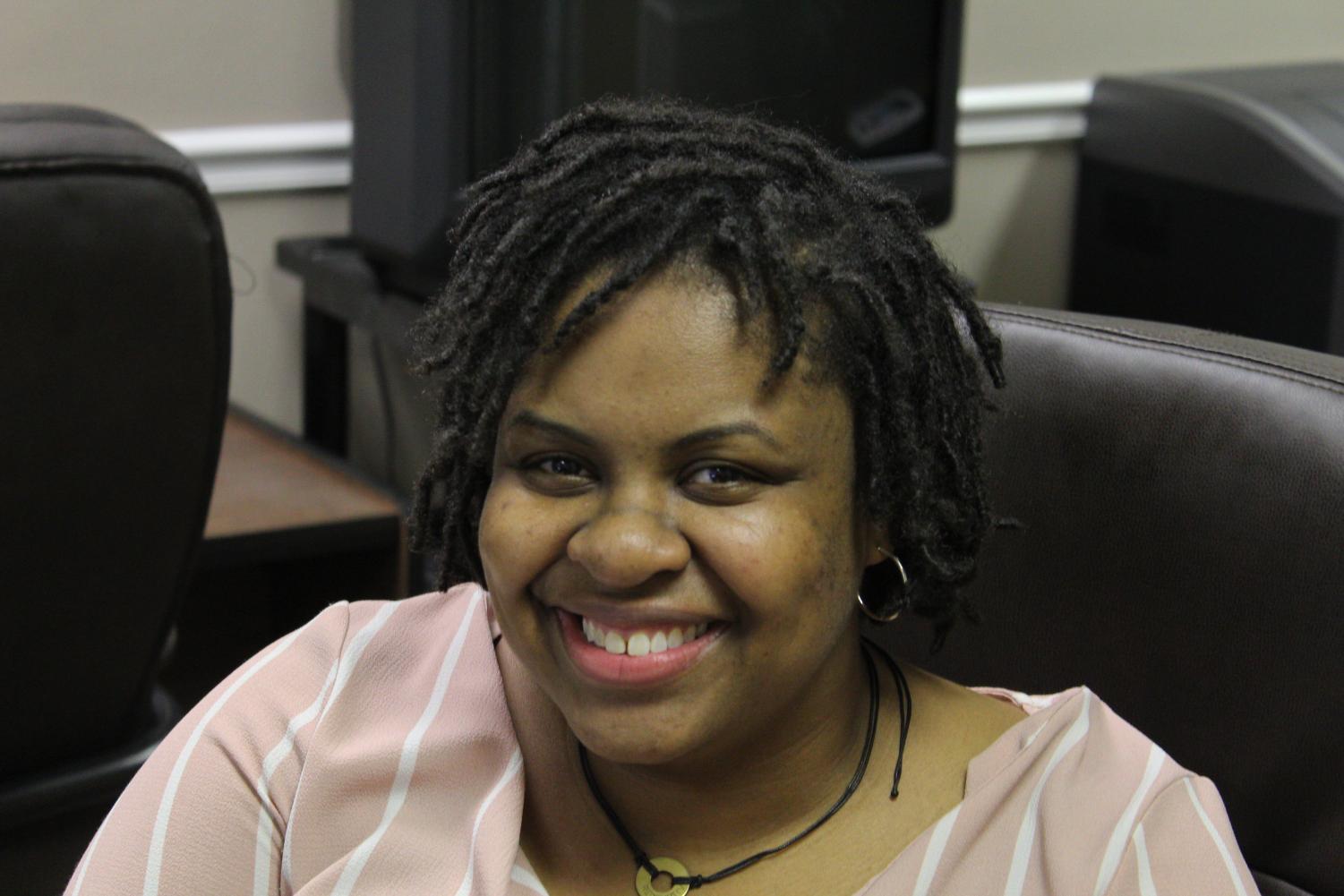
One of my final interviews was with the Director of Student Affairs, Mrs. LeAnn Alexander.
Mrs. Alexander has a very interesting perspective to share, as she recently switched from being an athletic’s department position for the MUW to MSMS for the Director of Student Affairs position.
“I’m a firm believer of just having that one name, especially from the institutional side of things. If you think about any of the other colleges or collegiate teams, they all have that one name. You know the Mississippi State Bulldogs, and you know the Auburn Tigers. I think it adds that consistency and adds that brand recognition so people know who you are.”
She also had some things to say about the role MSMS has to play when dealing with societal issues.
“I’d say it is our role on campus because we need to get some consistency. Once we have branded ourselves in-house, we can then begin to lead the way outside (campus).”
However, finding that branding provides many challenges from her perspective.
“Getting to a consensus could be challenge. Once we talk and figure out what’s best for us, then we can talk about a total re-brand and that does have costs. Getting the logo, getting marketing material that reflects this new name, but when we’re talking about Blue Waves, we’re often thinking about the athletic side of things. If we’re to re-brand the whole school, there will be some costs.”
MSMS is considering a complete re-branding.
Relating from her experience assisting with MUW Athletics, Mrs. Alexander saw the approach taken to unify the Owls under that brand, and alluded to wanting to take similar steps for MSMS so that the community would benefit.
“I think it would certainly build school spirit having that one mascot to rally behind.” She said.
Dr. Germain McConnell: “We’re investigating the history.”
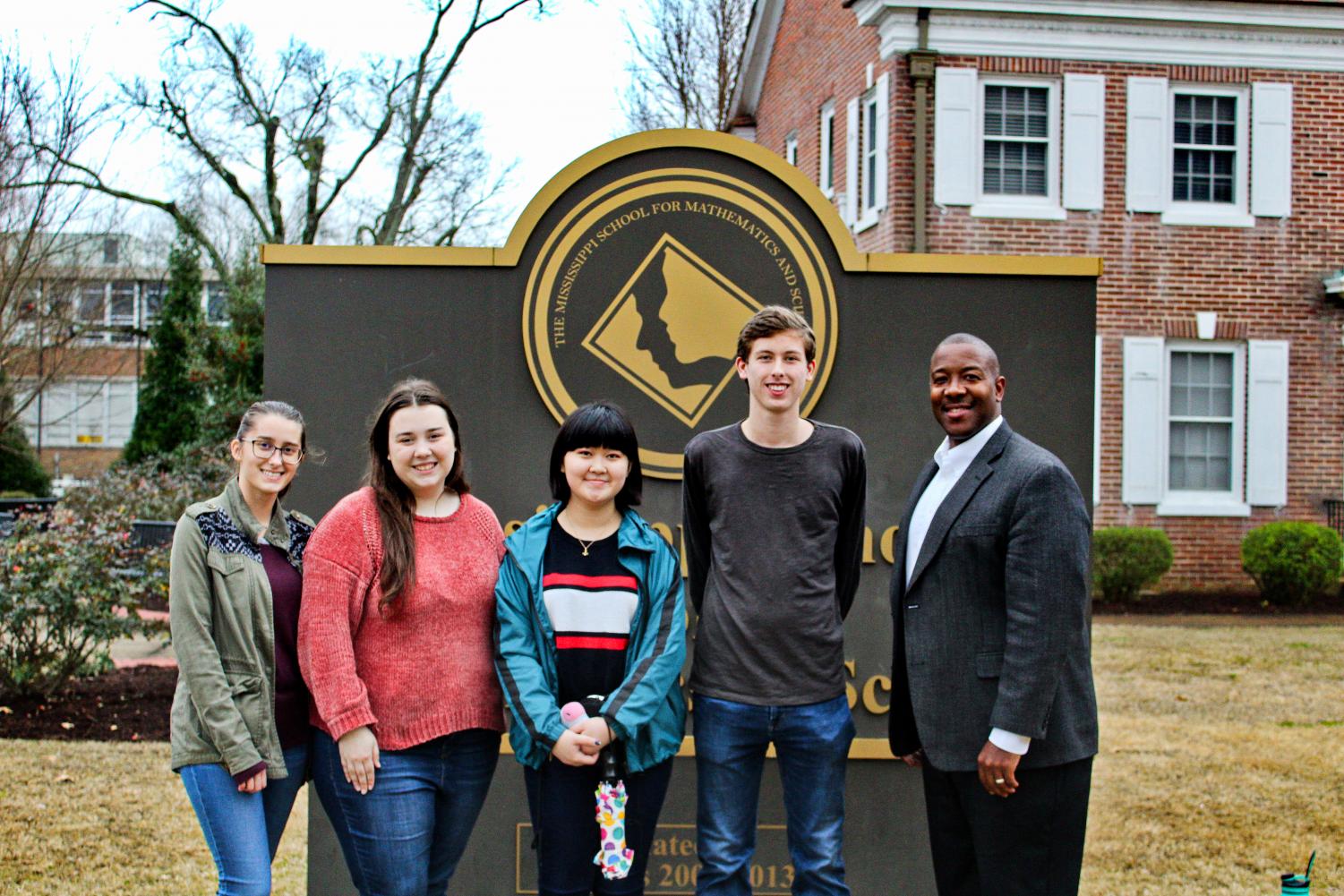
I interviewed Dr. McConnell during one of his ED Walks.
While my time with the other administrators was quite lengthy and enough to elaborate on several key points from both of their perspectives, Dr. McConnell’s interview was short.
I interviewed him on something MSMS calls an “ED Walk,” which is basically a group of five students walking around and talking about their experiences so far at the school.
For a group event like this, I definitely didn’t want to take everyone’s time, so I only asked two basic questions.
First, all the administration seemed to be standing firm on the idea that officially we are all Blue Waves and that the Lady Waves are something that the team nicknames themselves. Dr. McConnell was no exception.
“I think that sometimes for us officially we are the Waves, we don’t distinguish officially between the Lady Waves and Blue Waves. If the team members want to make that distinction themselves, they are free to do so, we just don’t officially recognize that distinction in our correspondence.”
The other question was dealing with the history of the Blue Waves name. Dr. McConnell stated that the school was looking into finding out some of that lost history.
“I’ve heard things here and there, but nothing is in writing. We’re currently investigating the history behind it so we have a pretty good identity of who we are.” He commented.
The Administration themselves are launching an investigation to find out where “Blue Waves” originates from.
After the final statement that the administration and faculty were investigating themselves what the history behind our name and school identity is, we continued on with the normal “ED Walk” which signaled the end of the investigation for me. Now came the difficult process of actually writing all of my discoveries down.
A Conclusion to the Investigation: The Process of Change
Several responsibilities we share as students and faculty often have us rushing to meet deadlines, combat stress, and produce trustworthy work. By having those responsibilities, it may seem trivial to stop, freeze the frame, and highlight a certain question that, in many cases, goes unnoticed by the general MSMS community.
We’re so busy with our responsibilities and running from point A to point B so that everything that isn’t a grade or a duty blends into the insignificant background of our lives. However, this shouldn’t always be the case.
Hopefully this article has in some part, made people stop from their busy schedules to think.
This article, and the steps of investigation leading up to this article, try to bring to the forefront of our minds why we have different names between boys’ and girls’ sports teams here at MSMS, a tradition that has been going on for at least two decades.
There are still many unanswered questions.
Where did the Blue Waves come from?
What will the future of MSMS branding look like?
How will MSMS honor legacy and continue to look forward to the future of the school?
These will have to be left to future articles and reporting, but for now, the investigation concludes with one final question:
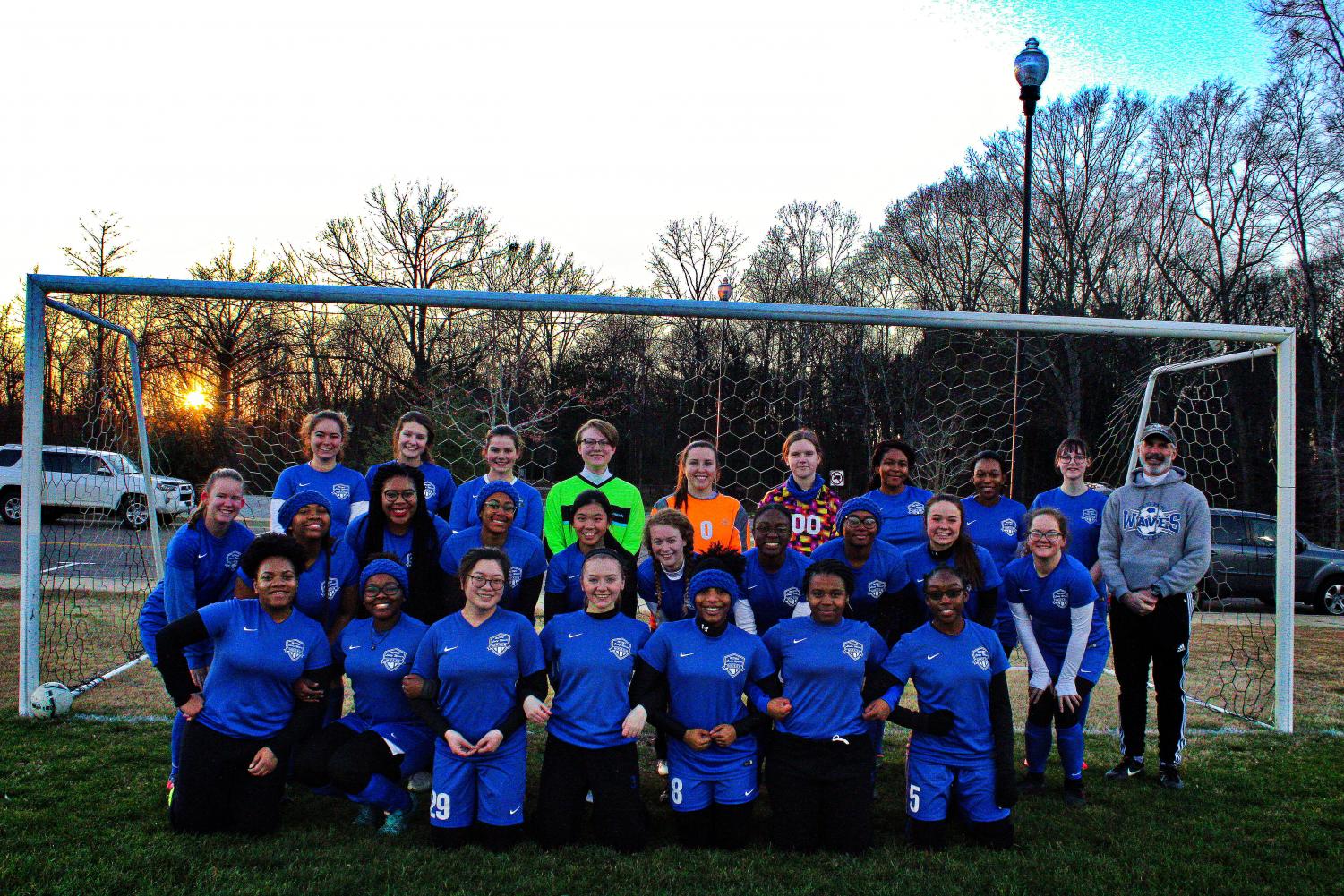
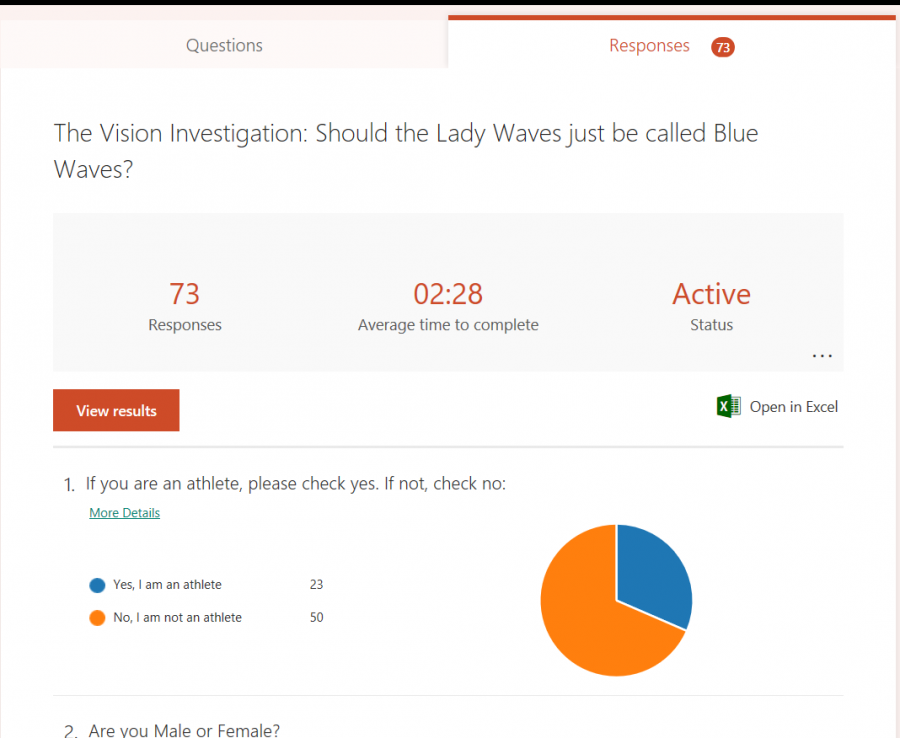
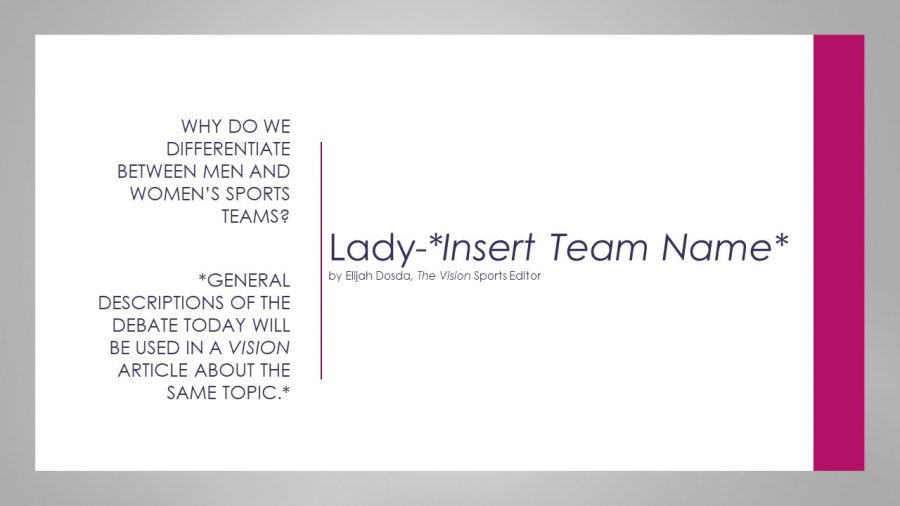
Jack Shelton • Feb 13, 2019 at 8:44 pm
I think the idea behind this article is pretty solid, however, I find multiple problems with the way the research was carried out. When considering the practice of Statistics and sampling, one must make sure they are following the correct steps and that their research is accurate. So, when asking the question, “Is the name ‘Lady Waves’ sexist or not?”, certain steps would need to be followed. For example, the wording of the question itself creates response bias because the word sexist is included. I would suggest trying something like “Do you think the name ‘Lady Waves’ should be changed to simply ‘Blue Waves’?” The response options here would simply be yes or no. The sample size for this is also quite large in relation to the MSMS population. When conducting a Simple Random Sample, 10% or less of an entire population should be polled to keep independence. This SRS should include a certain number of males, females, and athletes. Like I said, the idea for this article is a good one, but the stats are very faulty and are most likely a misrepresentation of the actual opinion.
Kindest regards,
Jack Shelton
Elijah Dosda • Feb 13, 2019 at 9:30 pm
Thank you for your constructive criticism. I haven’t had Statistics yet, so I worked to the best of my knowledge on creating an informal poll. All of the data from the polling section is prefaced with the notion that it isn’t representative of the MSMS community as a whole because of my inexperience and informal procedures. Mostly the polling data just served to help me gauge background on what some of the students felt, and to get certain issues or ideas to investigate further with coaches, players, administrators, alumni, etc.
I appreciate the criticism, and in following works will try to learn more about statistics in order to obtain more accurate representation of the Student Body.
Thank you for reading the article! I’m always looking to improve! -Elijah Dosda, The Vision Sports Editor